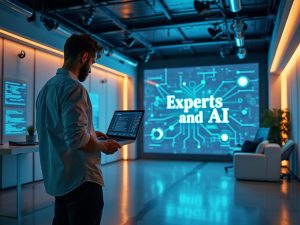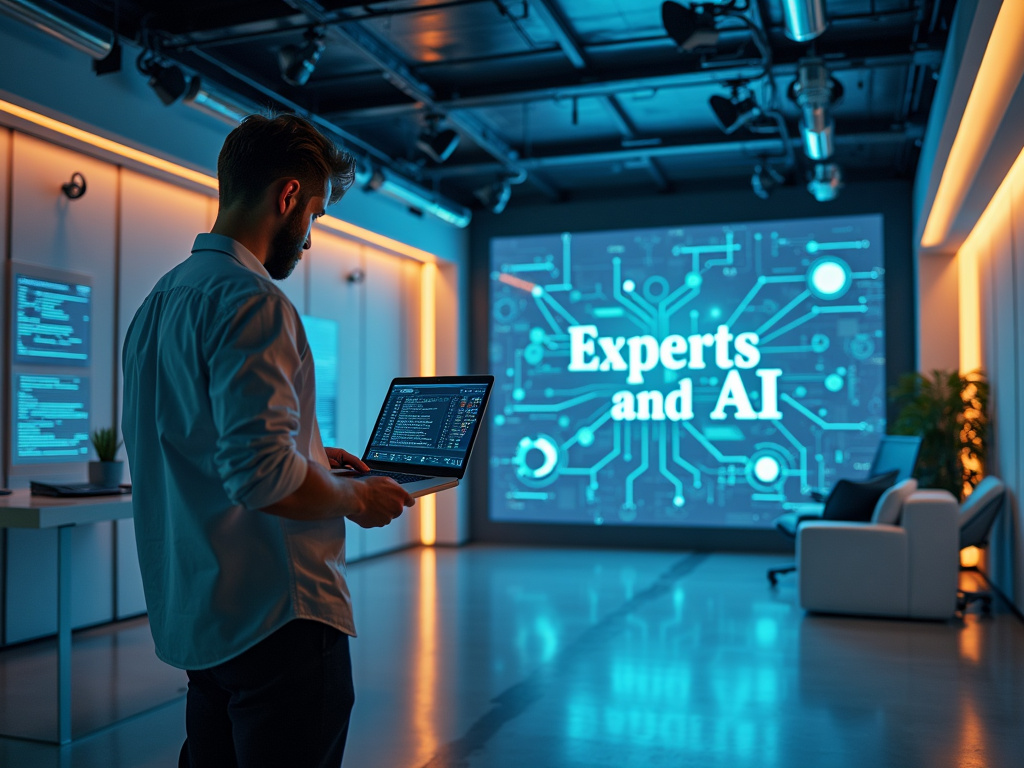In an era where artificial intelligence (AI) is rapidly transforming industries and infiltrating our daily lives, it’s crucial to understand its role as a tool rather than a replacement for human expertise. This blog post explores the synergy between AI and human experts, drawing parallels with historical information management practices and highlighting the unique advantages of this collaboration.

Introduction: The AI Revolution
Artificial intelligence has become an integral part of our modern world, from voice assistants on our smartphones to complex algorithms driving financial markets. As AI continues to evolve, questions arise about its potential to replace human expertise across various fields. However, a more nuanced perspective emerges when we consider AI as a powerful tool that enhances, rather than replaces, human capabilities.
This article posits that while AI is an invaluable resource for information gathering and processing, it is most effective when wielded by a human expert. This relationship between AI and human experts is reminiscent of the historical dynamic between people and their assistants, a comparison that offers valuable insights into the future of AI integration.
To frame this discussion, we’ll draw upon the thoughts of Rory Stewart, a prominent British diplomat and author, who has spoken extensively on the intersection of technology and human expertise.
From Written Records to AI: The Evolution of Information Management
The Historical Perspective
To understand the role of AI in today’s world, it’s helpful to look back at how humans have managed information throughout history. In ancient times, the advent of writing marked a significant leap in our ability to store and transmit knowledge. Written records allowed people to extend their memory beyond the limitations of the human mind, preserving information for future generations and enabling the accumulation of knowledge over time.
As societies grew more complex, a new role emerged: that of the personal assistant. These individuals served as living extensions of their employers’ memories and capabilities, managing schedules, correspondence, and vast amounts of information.
The Assistant as a Tool
Personal assistants were more than just repositories of information; they were active participants in the information management process. They contextualized data, prioritized tasks, and often acted as sounding boards for ideas. This human touch in information management provided a level of nuance and understanding that went beyond mere data storage.
The relationship between an individual and their assistant offers a compelling analogy for the potential of AI in our modern world. Just as assistants complemented human memory and organizational skills, AI has the potential to augment human problem-solving and decision-making capabilities.
AI: The Modern Assistant
AI’s Information Processing Prowess
One of the most significant advantages of AI is its ability to process and analyze vast amounts of data at speeds far beyond human capability. This trait makes AI an invaluable tool in fields that require the synthesis of large datasets, such as market research, scientific studies, and financial analysis.
For instance, traditional market research often relied on fixed surveys with predetermined questions. AI-driven research can now adapt in real-time, posing follow-up questions based on previous responses and uncovering deeper insights. This dynamic interaction mimics the natural flow of human conversation, leading to richer, more nuanced data collection.
The Interactive Advantage
AI’s ability to engage in interactive information gathering represents a significant leap forward. By adapting its queries based on previous responses, AI can explore unexpected avenues of inquiry, often leading to surprising and valuable insights. This capability is particularly useful in fields like market research, where understanding consumer behavior requires a flexible and responsive approach.
Moreover, this interactive nature of AI mirrors the back-and-forth of human dialogue, which is fundamental to disciplines such as philosophy. In these fields, the exchange of ideas and the challenging of assumptions are crucial to developing new theories and understanding complex concepts.
The Limits of AI: Why Human Expertise Remains Crucial
AI’s Cognitive Limitations
Despite its impressive capabilities, AI has significant limitations when it comes to critical thinking and creativity. While AI can process information at incredible speeds and identify patterns in vast datasets, it lacks the innate human ability to think abstractly, make intuitive leaps, or navigate highly ambiguous situations.
Take the field of philosophy, for example. Philosophy thrives on the human ability to question assumptions, explore abstract concepts, and engage in dialectical reasoning. These are areas where AI, despite its processing power, falls short. The nuanced understanding required to grapple with philosophical questions remains uniquely human.
The Irreplaceable Human Expert
This is where human experts come into play. Human experts bring a wealth of contextual understanding, intuition, and the ability to navigate complex or ambiguous situations that AI simply cannot match. They can:
1. Interpret data within broader contexts
2. Apply ethical considerations to decision-making
3. Think creatively to solve novel problems
4. Understand and account for human emotions and motivations
5. Make judgment calls in situations with incomplete or conflicting information
Human experts who understand how to leverage AI can use it to amplify their capabilities, rather than being replaced by it. By using AI as a tool to handle data-intensive tasks or generate initial analyses, experts can focus their energy on higher-level thinking, strategy, and innovation.
The Power of Synergy: AI and Human Experts Working Together
AI as an Enhancer, Not a Replacement
The true power of AI lies not in its potential to replace human experts, but in its ability to enhance their capabilities. When used effectively, AI can significantly boost the efficiency and effectiveness of human experts across various fields.
Consider a medical researcher working on developing a new treatment. AI can rapidly analyze vast databases of medical literature, clinical trial results, and genetic data, providing the researcher with a comprehensive overview of the current state of knowledge. The human expert can then use this information as a foundation, applying their expertise to identify promising avenues for further investigation, design innovative experiments, and interpret results within the broader context of human health and wellbeing.
Real-World Examples of Effective Collaboration
To illustrate the potential of AI-human collaboration, let’s explore a few hypothetical scenarios:
1. Legal Research: An experienced lawyer working on a complex case can use AI to quickly sift through thousands of previous court decisions, identifying relevant precedents. The lawyer then applies their expertise to craft compelling arguments, taking into account the nuances of the current case and the broader legal landscape.
2. Financial Analysis: A financial advisor can employ AI to analyze market trends, company performance data, and economic indicators. The advisor then uses their understanding of client needs, risk tolerance, and long-term financial goals to make personalized investment recommendations.
3. Urban Planning: City planners can utilize AI to process data on traffic patterns, population density, and resource usage. The human experts can then interpret this data within the context of community needs, environmental concerns, and long-term sustainability goals to design livable, efficient cities.
4. Education: Teachers can leverage AI to track student performance and identify areas where individuals may be struggling. The educators can then use their expertise in child development and learning strategies to create personalized intervention plans and support each student’s unique learning journey.
In each of these scenarios, AI serves as a powerful tool that augments human expertise, leading to outcomes that neither could achieve alone.
Conclusion: Embracing the AI-Human Partnership
As we navigate the AI revolution, it’s crucial to recognize that artificial intelligence, like any tool, is only as effective as the person using it. In the hands of an expert, AI becomes a powerful ally in navigating complex information landscapes and solving intricate problems.
The analogy between AI and historical assistants offers a valuable perspective on this relationship. Just as skilled individuals worked with their assistants to manage information and enhance their capabilities, today’s experts can collaborate with AI to push the boundaries of what’s possible in their fields.
As we move forward, the most successful professionals will be those who embrace AI as a tool while continuing to develop their critical thinking skills, creativity, and domain expertise. By doing so, we can harness the full potential of AI while preserving the irreplaceable value of human insight and judgment.
In this new era, our challenge is not to compete with AI, but to learn how to work alongside it effectively. By understanding both the capabilities and limitations of AI, we can create a future where human expertise is amplified, not replaced, by artificial intelligence.
So, as you consider the role of AI in your own field or daily life, ask yourself: How can I use this powerful tool to enhance my own expertise and capabilities? The answer to this question may well be the key to thriving in the AI-augmented world of tomorrow.
The idea for this blog post came after watching Rory Sutherland’s recent discussion with Alex O’Connor on the YouTube video “Why Logical Thinking is Illogical”. You can watch the video here.
